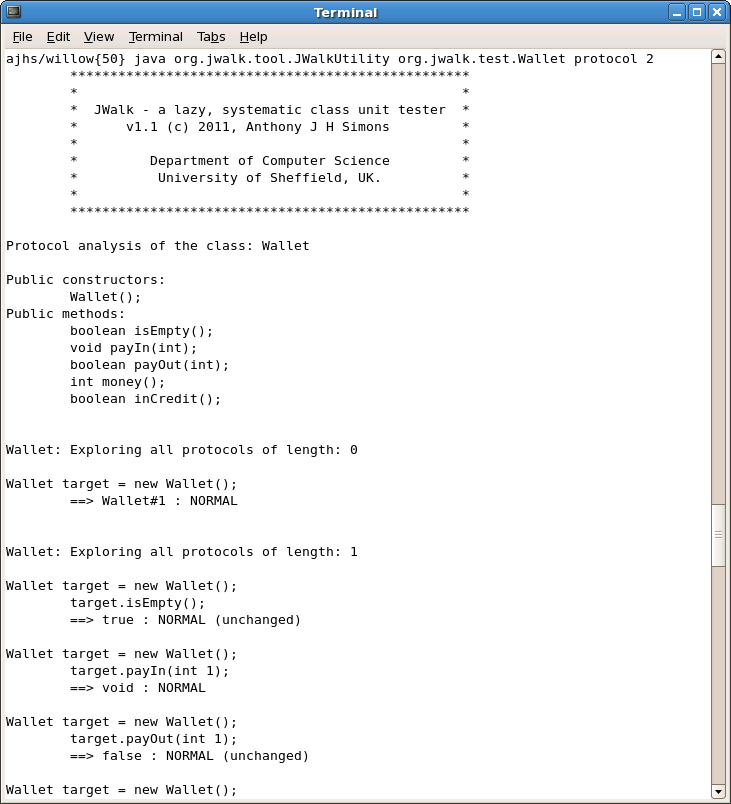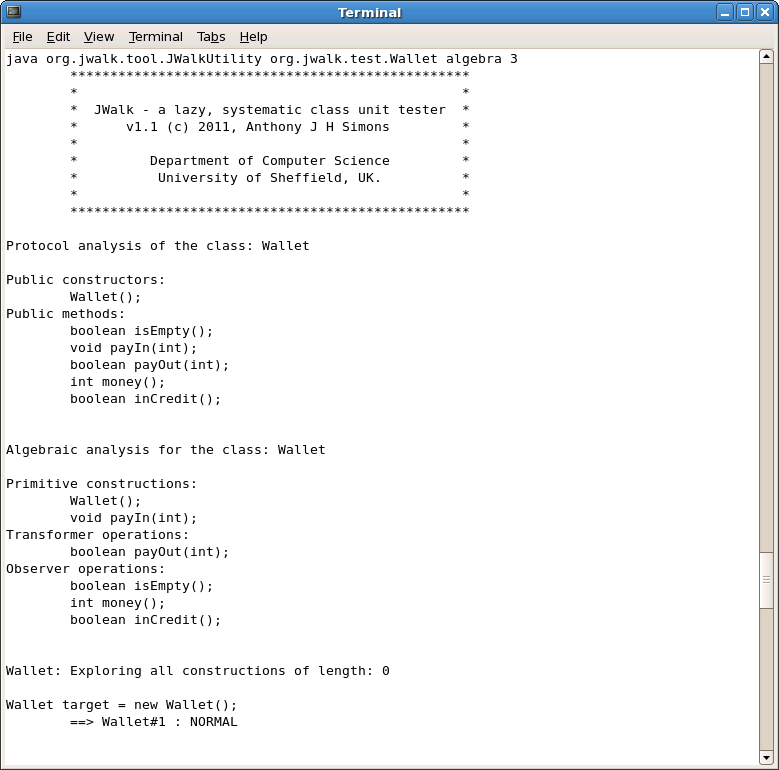
|

|
JWalk software testing tool suiteLazy systematic unit testing for agile methods |

|
The JWalkUtility User Guide
The original and classic tool in the JWalk 1.1 Tool Suite is the command-line driven unit testing tool JWalkUtility. This is provided for those who prefer command-line console interaction and plain text output. The style is similar to the old JWalk 0.8 Beta release, but uses the new JWalker core test engine. Please note that you must first have a valid license to run this tool, which is obtainable free for most academic and industrial evaluation purposes. For this and the software bundle, please follow the clear instructions given at the JWalk Download Centre.Launching JWalkUtilityThe following assumes that you have chosen your JWalk working directory, and have installed the software bundle: JWalk11.jar and an accompanying license: JWalkLicense.txt in this directory. Launching the Unbundled SoftwareThere is no option to run this tool directly from the compressed JAR-file download bundle, so you must unbundle the software archive first. Open a command console window and, in this console, change to your chosen JWalk working directory, in which the software bundle was placed. Unpack the archive using the command: jar -xf JWalk11.jarThis will create a Java package directory structure under your working directory. You may now launch the JWalkUtility tool using the Java command:
java org.jwalk.tool.JWalkUtility [ <testClass> ]
[ <strategy> | <modality> | <testDepth> |
<generator> | <probeDepth> | <stateDepth> |
<convention>]*
This will invoke the main() method of the class
JWalkUtility in the sub-package
org.jwalk.tool, and pass to it the parameters listed on the
command line, which are explained below.
After the license is recognised, the tool banner should appear in the console, followed later by the program's output.
Warning:
if you do not have a valid license, the program will terminate immediately
and a license violation message will be printed on the console!
Command Line ParametersBy default, executing the JWalkUtility tool
with no command line parameters merely prints out a message about correct usage.
In normal usage, the only mandatory parameter is
testClass.
Any integral parameter is treated as the testDepth. Any integer
prefixed by one of the letters t, p or s
is treated respectively as the testDepth, probeDepth
or stateDepth.
Any parameter containing the substring "Generator" is treated as
the name of a generator. Any other parameter is expected to name a
strategy or modality or convention
(see above for the expected
lower-case string values). No other settings can be altered by the
JWalkUtility tool.

Standard UsageThe most comonly used testing options available through the command-line interface are described here. For details of how to upload custom generators into the JWalkUtility tool, please refer to the Custom Usage section of this guide. For advice on how best to conduct testing using the JWalkUtility tool, please refer to the main User Guide section of this website. Default ExplorationInvoking JWalkUtility
with only the test class named on the command line will cause the
tool to execute with default settings for the remaining parameters.
For example, the following exercises all algebraic constructions of
a compiled java org.jwalk.tool.JWalkUtility StackThe output will contain a Protocol Report, an Algebra Report and several Cycle Reports for each test cycle, from depth 0 to depth 3 inclusive, followed by a Summary Report summarising the results of exploration (including how many sequences executed normally, or terminated with exceptions). Explicit ExplorationThe test strategy, modality and depth of exploration may be changed by
supplying further parameters on the command line. For example, the following
explores all high-level states and transitions of a
java org.jwalk.tool.JWalkUtility ReservableBook states 4The output will contain a Protocol Report, a State Report and several Cycle Reports for each test cycle, and for each detected state, from depth 0 to depth 3 inclusive, followed by a Summary Report summarising the results of exploration (including how many sequences executed normally, or terminated with exceptions). Inspection OnlyThe following example merely inspects the protocol of a
java org.jwalk.tool.JWalkUtility Wallet protocol inspectThe output will only contain a Protocol Report. In the algebra strategy, inspection will also include an Algebra
Report. In the states strategy, inspection will also include
a State Report.
Explicit ValidationThe following example causes the tool to interact with the tester. It
validates all algebraic constructions of the java org.jwalk.tool.JWalkUtility Stack algebra validate 3The interactive validation process is described below. The output will contain a Protocol Report, an Algebra Report and several Cycle Reports for each test cycle, from depth 0 to depth 3 inclusive, followed by a Summary Report summarising the results of validation (including how many outcomes were manually confirmed, or were automatically passed). Please refer to the main User Guide section for an explanation of test oracles and how they are used. Interaction with JWalkUtilityIn the
y. If the tester
chooses to quit, the current test series is aborted and the tool produces
the Summary Report directly.
An interactive query is presented at the console:
Stack target = new Stack();
target.isEmpty();
==> true
Confirm? (y|n|q):
and the tool waits for the tester to enter a valid response. If the tester
enters an invalid response, the query prompt is repeated. When all the results
for one test cycle are complete, the tool prints these out in a Cycle
Report.
At the end of a validation series, the test oracle is saved in an
oracle data file in the current working directory. The tester
will be asked to acknowledge the creation of this file:
The oracle file `Account.jwk' was written to: /programs/java/jwalk/ OK? (y):Entering a y or carriage return is sufficient. Other kinds of
warning may also need similar acknowledgement.
Custom UsageSometimes the tester will want to customise the behaviour of the
JWalkUtility tool, to adapt it to the needs of
a particular test class. The most significant custom option is the
ability to upload CustomGenerators, which control how test inputs
are synthesised for the test class. Other options allow you to
change the depth of probing during initial dynamic analysis, or change
the meaning of object state comparison from shallow to deeper equality,
or interleave the test class's methods selectively with methods
inherited from the root Custom GeneratorsThe tester may supply the name of a CustomGenerator class on
the command line, which is recognised by virtue of its name ending in
" Example Custom GeneratorsThe following example exercises all method protocols of a
java org.jwalk.tool.JWalkUtility Vector protocol 2 IndexGeneratorIt is assumed that IndexGenerator.class is a compiled Java
class file that is accessible to Java. This custom generator will be
installed as a delegate of the MasterGenerator used by
the tool, and will intercept requests to generate int values.
For an explanation of how it does this, please refer to the section on how to
create Custom Generators for JWalk.
The following example explores the class java org.jwalk.JWalkUtility Main protocol 3 org.jwalk.gen.RedirectInGeneratorThis initially generates a file input.txt, in the current
working directory, which is used to supply text lines of input for the
test class. The tester may edit this file, so that it contains
the kinds of input expected.
Custom Depth ParametersBy default, integer values are always interpreted as the
java org.jwalk.JWalkUtility Wallet algebra p14 t5 exploreThis initially probes the Wallet to depth 14 (to determine
the state effects of methods over a much larger sample of test sequences)
and then explores it to depth 5 during the main test series.
The following example alters the tree-depth to which object states are
compared, when exploring the algebraic structure of a
java org.jwalk.JWalkUtility StackProxy algebra s1 t5 exploreThis compares object clusters to a tree depth of 1 (no longer shallow equality), while exploring the algebraic structure to a depth of 5 during testing. Interleaving Object's MethodsThe following example interleaves the test class's methods
with some of the standard methods inherited from the root class
java org.jwalk.JWalkUtility Stack algebra custom 3The custom parameter will cause JWalk to explore test
sequences that interleave the inherited methods
equals(), hasCode(), toString()
and getClass() with Stack's local methods.
Other parameters include standard and complete.
Output FormatThe JWalkUtility tool prints all results on standard output. The kinds of output supported are similar to the kinds of Test Report described for the JWalkTester tool, the only difference being that all output is sent to the console as plain text. Test ReportsThe test results will appear as blocks of output text, preceded by a banner. Different blocks may appear for different test strategies, modalities and depths. In interactive modes, the output blocks will be interrupted by interactive queries to confirm or reject test outcomes. The Test Reports contain the following information:
org.jwalk.out.
Handling ExceptionsAny notifications or warnings must be acknowledged by the tester (typing carriage return is understood to mean "OK"). Any exceptions that cause JWalkUtility to terminate will be printed on standard error. |